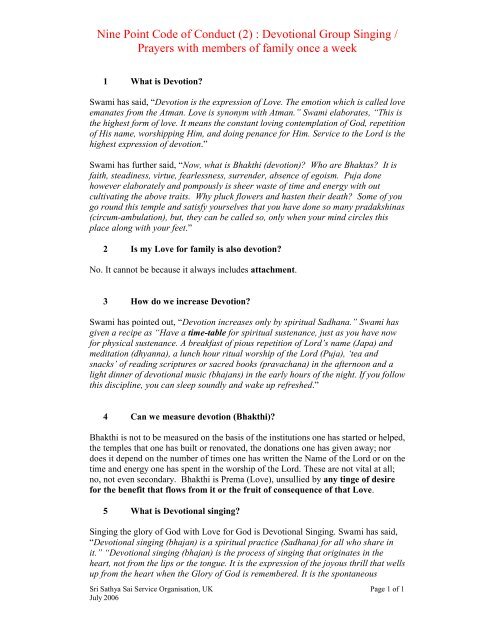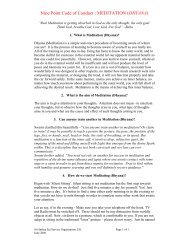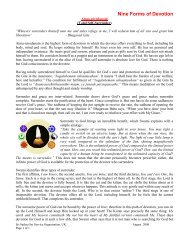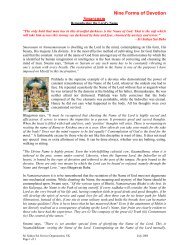Nine Point Code of Conduct - Sathya Sai Service Organisation ...
Nine Point Code of Conduct - Sathya Sai Service Organisation ...
Nine Point Code of Conduct - Sathya Sai Service Organisation ...
You also want an ePaper? Increase the reach of your titles
YUMPU automatically turns print PDFs into web optimized ePapers that Google loves.
<strong>Nine</strong> <strong>Point</strong> <strong>Code</strong> <strong>of</strong> <strong>Conduct</strong> (2) : Devotional Group Singing /<br />
Prayers with members <strong>of</strong> family once a week<br />
1 What is Devotion?<br />
Swami has said, “Devotion is the expression <strong>of</strong> Love. The emotion which is called love<br />
emanates from the Atman. Love is synonym with Atman.” Swami elaborates, “This is<br />
the highest form <strong>of</strong> love. It means the constant loving contemplation <strong>of</strong> God, repetition<br />
<strong>of</strong> His name, worshipping Him, and doing penance for Him. <strong>Service</strong> to the Lord is the<br />
highest expression <strong>of</strong> devotion.”<br />
Swami has further said, “Now, what is Bhakthi (devotion)? Who are Bhaktas? It is<br />
faith, steadiness, virtue, fearlessness, surrender, absence <strong>of</strong> egoism. Puja done<br />
however elaborately and pompously is sheer waste <strong>of</strong> time and energy with out<br />
cultivating the above traits. Why pluck flowers and hasten their death? Some <strong>of</strong> you<br />
go round this temple and satisfy yourselves that you have done so many pradakshinas<br />
(circum-ambulation), but, they can be called so, only when your mind circles this<br />
place along with your feet.”<br />
2 Is my Love for family is also devotion?<br />
No. It cannot be because it always includes attachment.<br />
3 How do we increase Devotion?<br />
Swami has pointed out, “Devotion increases only by spiritual Sadhana.” Swami has<br />
given a recipe as “Have a time-table for spiritual sustenance, just as you have now<br />
for physical sustenance. A breakfast <strong>of</strong> pious repetition <strong>of</strong> Lord’s name (Japa) and<br />
meditation (dhyanna), a lunch hour ritual worship <strong>of</strong> the Lord (Puja), ‘tea and<br />
snacks’ <strong>of</strong> reading scriptures or sacred books (pravachana) in the afternoon and a<br />
light dinner <strong>of</strong> devotional music (bhajans) in the early hours <strong>of</strong> the night. If you follow<br />
this discipline, you can sleep soundly and wake up refreshed.”<br />
4 Can we measure devotion (Bhakthi)?<br />
Bhakthi is not to be measured on the basis <strong>of</strong> the institutions one has started or helped,<br />
the temples that one has built or renovated, the donations one has given away; nor<br />
does it depend on the number <strong>of</strong> times one has written the Name <strong>of</strong> the Lord or on the<br />
time and energy one has spent in the worship <strong>of</strong> the Lord. These are not vital at all;<br />
no, not even secondary. Bhakthi is Prema (Love), unsullied by any tinge <strong>of</strong> desire<br />
for the benefit that flows from it or the fruit <strong>of</strong> consequence <strong>of</strong> that Love.<br />
5 What is Devotional singing?<br />
Singing the glory <strong>of</strong> God with Love for God is Devotional Singing. Swami has said,<br />
“Devotional singing (bhajan) is a spiritual practice (Sadhana) for all who share in<br />
it.” “Devotional singing (bhajan) is the process <strong>of</strong> singing that originates in the<br />
heart, not from the lips or the tongue. It is the expression <strong>of</strong> the joyous thrill that wells<br />
up from the heart when the Glory <strong>of</strong> God is remembered. It is the spontaneous<br />
Sri <strong>Sathya</strong> <strong>Sai</strong> <strong>Service</strong> <strong>Organisation</strong>, UK Page 1 <strong>of</strong> 1<br />
July 2006
<strong>Nine</strong> <strong>Point</strong> <strong>Code</strong> <strong>of</strong> <strong>Conduct</strong> (2) : Devotional Group Singing /<br />
Prayers with members <strong>of</strong> family once a week<br />
manifestation <strong>of</strong> inner ecstasy. No attention is paid to the blame or praise that others<br />
may give. It does not seek the admiration or the appreciation <strong>of</strong> the listeners.”<br />
6 What are the benefits <strong>of</strong> Devotional singing?<br />
Benefits <strong>of</strong> devotional singing are many folds. Swami has said, “Devotional singing<br />
(bhajan) is one <strong>of</strong> the processes by which you can train the mind to expand into<br />
eternal values. Teach the mind to revel in the glory and majesty <strong>of</strong> God; wean it away<br />
from petty horizons <strong>of</strong> pleasure. Devotional singing induces in you a desire for<br />
experiencing the truth, to glimpse the beauty that is God, to taste the bliss that is the<br />
Self. It encourages man to dive into himself and be genuinely his real self.”<br />
Swami has further said, “It encourages man to dive into himself and be genuinely his<br />
Real Self. Once that search is desired, the path is easy. One has only to be reminded<br />
that he is divine. The malady is; it is being thrust out <strong>of</strong> recognition. Man has come<br />
for a great destiny, on a sacred mission, endowed with special skills and tendencies to<br />
help him on; but, he fritters these precious gifts and crawls on earth from birth to<br />
death, worse than animal. Exercises like bhajan elevate the mind and exhort the<br />
individual to seek and find the source <strong>of</strong> eternal joy that lies within him.”<br />
Swami emphasises - “Remember, every song sung in praise <strong>of</strong> the Lord is a sword<br />
that cuts the knots <strong>of</strong> laziness. It is a fine piece <strong>of</strong> social service to remind all <strong>of</strong> their<br />
duty to the Almighty, who watches over them.”<br />
7 From what age one should start singing devotional singing (bhajans)?<br />
Swami says, “The procession to the cremation ground starts immediately on birth and<br />
the beating <strong>of</strong> the heart is the drum beat or the march towards that place. Some take a<br />
longer route, some reach quickly, but all are on the way. Therefore, bhajans has to<br />
start in childhood and has to continue. It must be the constant companion <strong>of</strong> man, his<br />
solace and strength. Do not postpone it to old age for it is essential food for the<br />
mind.”<br />
8 What is Devotional Group Singing and the reason to do that?<br />
The group singing <strong>of</strong> devotional songs (bhajans) is called Devotional Group Singing.<br />
Swami advises, “Sing aloud the glory <strong>of</strong> God and charge the atmosphere with divine<br />
adoration. That is why I insist on group singing <strong>of</strong> the names <strong>of</strong> the Lord.”<br />
Swami points out, “Realise that there is nothing greater than bhajan. What bliss is<br />
there in bhajans! What a demonstration <strong>of</strong> oneness is it when a myriad throats join in<br />
uttering the name <strong>of</strong> God! The vibrations emanating from them make the heart<br />
vibrant. If you sing alone in your shrine, the vibrations return to you as a reaction.<br />
But in community singing, what you have is not a reaction but a wave <strong>of</strong> vibrations.<br />
They enter into the atmosphere and purify the polluted air. The atmosphere today is<br />
polluted by bad thoughts and feelings. When you sing the glory <strong>of</strong> God, the bad germs<br />
in the air are destroyed and the air gets purified by a treatment <strong>of</strong> antibiotics, as it<br />
were.”<br />
Sri <strong>Sathya</strong> <strong>Sai</strong> <strong>Service</strong> <strong>Organisation</strong>, UK Page 2 <strong>of</strong> 2<br />
July 2006
<strong>Nine</strong> <strong>Point</strong> <strong>Code</strong> <strong>of</strong> <strong>Conduct</strong> (2) : Devotional Group Singing /<br />
Prayers with members <strong>of</strong> family once a week<br />
Swami has further said, “Group singing is very good. If only individual sings, it is no<br />
good. You get joy when you sing and clap together with similar devotional feelings in<br />
your hearts. Singing in harmony gives pleasure to the ears. All students should attain<br />
divinity by chanting the glories <strong>of</strong> God and singing bhajans. Whatever you think you<br />
become that. Put your heart and soul into chanting the name with love.”<br />
9 In what language we should sing?<br />
In fact, that really does not matter in which language you sing, as long you sing from<br />
heart and your mind is on god. That’s it. Swami says, “When asked if singing bhajans<br />
in English would spoil the sound vibrations: ‘No, the vibrations come from the heart’ ”<br />
10 Why do Devotional group singing/prayer with members <strong>of</strong> the family?<br />
A human being is born into a family and assimilates the elements <strong>of</strong> the family<br />
environment as he or she grows up. Because one’s early environment has such an<br />
enormous impact on every child’s development. The family must lay the foundation<br />
for social reformation and for spiritual enlightenment. Without a solid family<br />
institution, the means and resources to grow wither in the external or spiritual worlds<br />
cannot come together. When all members <strong>of</strong> the family have one objective and work<br />
together with full cooperation, they reach their goal with fewer distractions and<br />
impediments. Such an ideal family is a perfect training centre where every member<br />
learns the art <strong>of</strong> living happy life. However, there cannot be such an ideal family<br />
unless people devote part <strong>of</strong> their time to spiritual practices.”<br />
There is a saying, “If you pray together you stay together.” Just for a moment think,<br />
what does this concludes to? May be when the family members sit together and have<br />
a prayer and a meal they might also talk to each other and get to know each other<br />
better, solve each others problems. Probably understand each others problems at that<br />
point <strong>of</strong> time. Perhaps, in today’s life style, which is very fast, everybody is so busy,<br />
that even they do not have time to talk to each other. May be this is the way to be<br />
together at least once a day for a while.<br />
Devotional group singing and/or praying with the members <strong>of</strong> the family has some<br />
different effect. Let us analyse them by an example. Tune two radio sets to different<br />
frequencies, i.e., listen to two different radio programs at the same time. What you<br />
will hear? There will be overlapping <strong>of</strong> voice, and probably, you will not enjoy either<br />
<strong>of</strong> them. Now tune both radio sets to the same frequency, i.e., listen to the same<br />
program at the same time. Do you hear two separate voices coming out <strong>of</strong> two<br />
different radio sets? No, even you will not hear an iota <strong>of</strong> difference. Even you will<br />
not know that two different radio sets are switched on at the same time, as you will<br />
only hear one voice. Similarly when two people are singing together initially both will<br />
be singing in different frequency, so two different voices will be heard. But to make<br />
the song more melodious, they will attempt to sing at the same frequency or as close<br />
as possible and apparently the song will be melodious. So what does this mean?<br />
Two people are trying to be tuned to the same frequency <strong>of</strong> devotion. Because when<br />
one sings the glory <strong>of</strong> Rama then at the same time one must try to bring Rama’s<br />
qualities onto oneself. The singing together will bring two people in harmony with<br />
Sri <strong>Sathya</strong> <strong>Sai</strong> <strong>Service</strong> <strong>Organisation</strong>, UK Page 3 <strong>of</strong> 3<br />
July 2006
<strong>Nine</strong> <strong>Point</strong> <strong>Code</strong> <strong>of</strong> <strong>Conduct</strong> (2) : Devotional Group Singing /<br />
Prayers with members <strong>of</strong> family once a week<br />
each other. That’s why the musical instrument is called Harmonium, as it is supposed<br />
to be played in Harmony with the voice. By singing devotional song together, the<br />
group will be attempting to be in harmony with each other in the long run the family<br />
harmony will gradually build up and be there permanently. As a result gradually the<br />
entire family will start having harmony in thoughts too; when the family has harmony<br />
in thoughts so the harmony in action will follow later.<br />
Swami has said, “When all the participants in a bhajan sing in unison, what sacred<br />
vibrations are produced and what Divine energies are released! When these<br />
vibrations are produced and what Divine energies are released! When these<br />
vibrations fill the world, what changes cannot they bring about! When one sings<br />
alone, the heart is merged in the song. But when many sing together, it acquires a<br />
Divine power.”<br />
11 How this harmonises thoughts?<br />
There are three aspects <strong>of</strong> harmony.<br />
a) Individual<br />
b) Universal<br />
c) Eternal<br />
Firstly one should harmonize himself, that is, establish harmony in thoughts, words<br />
and deeds. Even before that, he must purify his thoughts by contemplating on God by<br />
means <strong>of</strong> Japa, meditation, prayer and singing Bhajans. If the thoughts are purified<br />
then words and deeds would follow. The whole individual would be purified. Swami<br />
says, “Where there is dharma and righteousness in the heart, there will be promoted<br />
good qualities. Where there are good qualities, you will find harmony and where<br />
there is harmony, there will be order. If you find order and discipline, you will peace<br />
in the world. Therefore peace depends on the quality <strong>of</strong> the individual.”<br />
When the individual is purified then the same purification exercise can be taken for<br />
the group or community, say by additional group/community singing, known as<br />
Sankeertanam. Swami has said, “Samyak-keerthanam Sankeerthanam”<br />
(Congregational singing <strong>of</strong> bhajans) is the best way <strong>of</strong> singing bhajans. There is a<br />
big difference between Keerthanam and Sankeerthanam. Keerthanam is an<br />
individual affair. It is singing by an individual for the fulfilment <strong>of</strong> his prayers.<br />
Sankeerthanam aims at the well being <strong>of</strong> the whole universe. This is also described as<br />
Saamaajika bhajans<br />
(community singing). This method <strong>of</strong> singing bhajans was first initiated by Guru<br />
Nanak, the founder <strong>of</strong> Sikhism. Sankeerthanam aims at demonstrating unity in<br />
diversity. When all the participants combine to sing in unison with one voice, it is<br />
described as Sankeerthana.”<br />
Once the entire group/community gets purified and starts going towards God as the<br />
ultimate goal <strong>of</strong> life, then they start living in God not for a day or two but always.<br />
They recognise the in dweller and start becoming one with Him and ultimately<br />
become one with HIM. Then there are no two individuals, there is only one and that is<br />
GOD. They will not feel themselves different from GOD at any time.<br />
Sri <strong>Sathya</strong> <strong>Sai</strong> <strong>Service</strong> <strong>Organisation</strong>, UK Page 4 <strong>of</strong> 4<br />
July 2006
<strong>Nine</strong> <strong>Point</strong> <strong>Code</strong> <strong>of</strong> <strong>Conduct</strong> (2) : Devotional Group Singing /<br />
Prayers with members <strong>of</strong> family once a week<br />
Swami has said, “You are not the body, a bundle <strong>of</strong> flesh, blood and bones. Neither<br />
are you the unmanifested desire, nor the manifested mind. You are also not the<br />
infatuating delusion that thwarts your liberation. But you are the Eternal<br />
Paramatman, if only you recognise your innate power. The body, the senses, the mind<br />
and the intellect are only the vestures put on by man. Only when we understand the<br />
nature and significance <strong>of</strong> these adjuncts, can we make proper use <strong>of</strong> them.”<br />
12 Why once a week?<br />
It is the least - Just to have a regular and disciplined way to enhance the family<br />
togetherness. But you can – if all are willing - do this more than once a week.<br />
13 Why does it start from home?<br />
Where there is harmony in the home,<br />
There will be order in the nation,<br />
When there is order in the nation,<br />
There will be peace in the world.<br />
So home is the staring point for bringing the family together and keeping<br />
them together. Prayer and devotional singing is the best way to achieve<br />
this unity which will overflow into the community and when communities<br />
achieves this, will over flow in to the nation to create a united nation.<br />
14 Family is the starting point for love, peace, harmony and joy.<br />
“Wherever my devotee sings my name, I am present there” – Baba.<br />
Hence devotional singing is a good way <strong>of</strong> bringing Swami in to one’s life<br />
Sri <strong>Sathya</strong> <strong>Sai</strong> <strong>Service</strong> <strong>Organisation</strong>, UK Page 5 <strong>of</strong> 5<br />
July 2006













